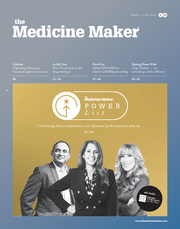Charting the Future of IBD Trials
Acknowledging the shortcomings in IBD-related clinical trials and a potential holistic approach to overcoming them
Deepika Khedekar | | 5 min read | Opinion

Credit: Author supplied
In the US, a staggering 1.6 million people live with inflammatory bowel disease (IBD) – and that number has been on the rise since 2011, as reported by the Crohn’s & Colitis Foundation. Globally, 4.9 million individuals, including 80,000 children, suffer from IBD. The need for therapeutics is significant, which is likely why there are more than 3,000 IBD-focused clinical trials listed on the database of the National Library of Medicine.
IBD is an umbrella term for two conditions – Crohn’s disease and ulcerative colitis. These conditions are notorious for causing chronic inflammation in the gastrointestinal tract, which can lead to serious damage. Though the exact causes of IBD aren't fully understood, there appears to be a link with a compromised immune system.
A primary concern in IBD clinical trials is the abnormally high screen failure rate, which hovers between 50 and 70 percent. This high figure is driven by the unpredictable nature of disease flare-ups (many trials require patients to be in an active flare-up for enrollment) and the lengthy washout periods (4–8 weeks) required from previous GI medications.
Invasive procedures, such as colonoscopies, and the time commitment for infusion-based therapies also act as deterrents. But this problem doesn’t just delay the trials, it can also lead to reduced representation of IBD patients. Indeed, IBD trials face significant challenges with age and gender biases, which affects their diversity and representativeness. Women, for instance, experience longer diagnostic delays and are more prone to misdiagnoses (1). And in a review of 222 phase III IBD studies, 58 percent excluded older patients despite them comprising a growing segment of the IBD population. Just 5.4 percent of trial participants were over 65 in those studies (2). This oversight means less information on older patients and how they respond to treatments, which skews trial results.
In the realm of IBD clinical trials, ethical dilemmas and methodological shifts present additional significant challenges. One key ethical question surrounds the use of placebos. Despite the availability of effective IBD treatments, many studies still opt for placebos (3). According to ethical guidelines, notably the Declaration of Helsinki, the use of a placebo is recommended only when no effective treatment exists or it does not significantly harm patients. However, the choice to use an active drug as a comparator, ensuring all participants receive some form of treatment, necessitates more participants and extends trial duration. The risk here is disease progression in those randomized to receive placebos, potentially discouraging patient participation.
Furthermore, there’s a notable shift in trial methodology from symptom-based assessments to objective measures, such as endoscopy, serum C-reactive protein (CRP), and fecal calprotectin (FCP) (4). This transition aims to enroll patients with active disease more accurately, thus reducing the rates of placebo effects. However, this shift brings its own set of challenges, especially because many participants in these trials have undergone extensive treatments. This extensive treatment history can lead to diminished responsiveness to new therapies, resulting in smaller observed treatment effects.
Such a history makes it difficult to distinguish between the actual efficacy of a new treatment and the reduced responsiveness of a treatment-experienced patient population, significantly impacting trial outcomes and affecting the perceived effectiveness of new therapies. Balancing these ethical and methodological issues is crucial.
We must also face up to the hardships that participants face during and after the trials. IBD trial participants are dealing with physical, emotional, and financial burdens – and once the trial is complete, what happens to their access to treatment? What if they are suddenly cut off from a drug that was helping them? Well, abruptly discontinuing a drug can lead to immunogenicity, causing the body to develop antibodies against the drug, reducing effectiveness or increasing therapeutic resistance. This concern is heightened in early phase trials or in situations where the drug’s development is halted, even if it had shown promise during the trial. We must think about how we can reduce the burden of participants during the trial, safeguard their wellbeing, and ensure they continue to have access to treatments afterward.
In IBD research and trials, the efficacy and scope are significantly impacted by the prevalent one-size-fits-all approach that often neglects crucial biological differences, such as sex-specific genetic variations. This generalization in research methodology can result in therapies that are not effectively tailored to individual patient needs, impacting the overall success and applicability of trial outcomes, as these biological factors play a critical role in disease progression and treatment response. If that’s not enough, research indicates a heightened risk of cancer and cardiovascular diseases in individuals with IBD and a vast majority of these trials do not factor patients with these conditions into their trial program (5,6). These research gaps throw a wrench in the validity and effectiveness of IBD research, potentially resulting in less effective treatment strategies and a narrower disease understanding.
In conclusion, IBD clinical trials face a gamut of challenges. Researchers should therefore be open to a comprehensive, patient-centric, holistic approach. The onus is on us to adapt and evolve to ensure trials are scientifically rigorous, inclusive, ethical, and reflective of the diverse needs of the IBD patient population.
In short, our clinical research should be as dynamic and diverse as the community we’re trying to help.
- L Sempere et al, “Gender Biases and Diagnostic Delay in Inflammatory Bowel Disease: Multicenter Observational Study”, Inflammatory Bowel Diseases, 29, 12. (2023). DOI: 10.1093/ibd/izad001
- S Vieujean et al, “Is it time to include older adults in inflammatory bowel disease trials? A call for action”, The Lancet Healthy Longevity, 3, 5, (2022). DOI: 10.1016/S2666-7568(22)00060-5, https://www.thelancet.com/journals/lanhl/article/PIIS2666-7568(22)00060-5/fulltext
- D Sharp et al, “Listening to the Patient: Improving the Design and Conduct of Clinical Trials in Inflammatory Bowel Diseases”, Crohn‘s & Colitis 360, 2, 1. (2020), DOI: 10.1093/crocol/otaa011
- R Khanna et al, “Evolution of the Randomized Controlled Trial in Inflammatory Bowel Disease: Current Challenges and Future Solutions”, Inflammatory Bowel Diseases, 24, 10. (2018) DOI: /10.1093/ibd/izy117
- A Akiya et al, “Novel Findings of Early Cardiac Dysfunction in Patients With Childhood-Onset Inflammatory Bowel Disease Using Layer-Specific Strain Analysis”, Inflammatory Bowel Diseases, 29, 10, (2023), DOI: 10.1093/ibd/izad031
- D Desai and P Dhoble, “Rapidly changing epidemiology of inflammatory bowel disease: Time to gear up for the challenge before it is too late”, Indian J Gastroenterol (2023). DOI: 10.1007/s12664-023-01453-6
Deepika Khedekar is an Associate Centralized Clinical Trial Lead at IQVIA Inc, a global clinical research organization, where she spearheads clinical trial monitoring programs for major pharmaceutical companies. In her 12+ years in the pharmaceutical industry, she led phase I, II, and III clinical trial programs in the respiratory and gastrointestinal therapeutics, including drugs for leading US and Australia-based pharmaceutical organizations, such as Gilead Sciences, Macleods Pharma, Arrowhead Pharmaceuticals, NoNO Inc., EpimAb, and Impact Pharma. She started her journey in the field of pharmaceutical research at Pfizer and holds a Master’s degree in Pharmacy from the University of Mumbai.


















